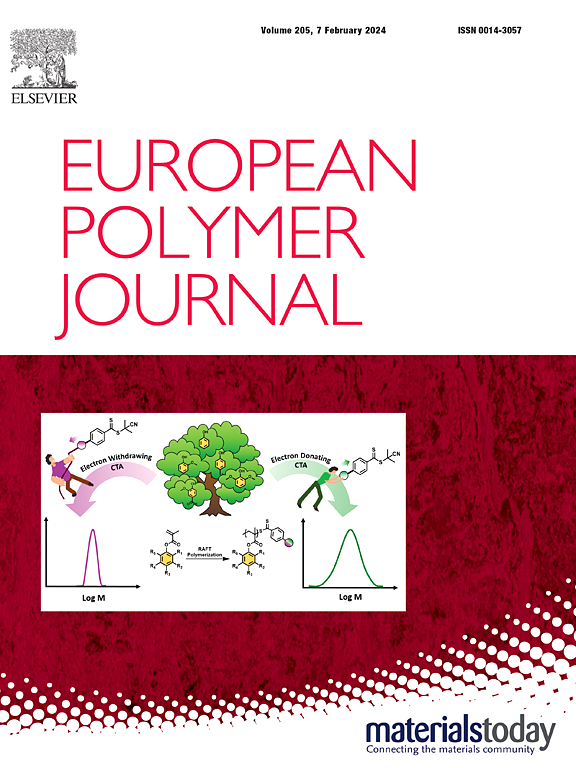Towards sustainable 3D Printing: A biodegradable hybrid resin from avocado oil and lignin
IF 5.8
2区 化学
Q1 POLYMER SCIENCE
引用次数: 0
Abstract
Driven by the urgent need to reduce reliance on petroleum-based plastics and mitigate environmental impact, this research explores the development of highly biobased, 3D printable resins. This study investigates the fabrication of sustainable 3D printed objects using a novel hybrid resin comprising acrylated avocado oil and lignin-based nanocontainers. Avocado oil, a renewable resource, was successfully acrylated via a one-step reaction, achieving a high grafting rate of 72 %. Lignin-based nanocontainers, synthesized via miniemulsion polymerization, were incorporated into the acrylated avocado oil at 1 and 3 wt% loadings. These hybrid resins demonstrated excellent 3D printability using LCD-SLA technology. Characterization techniques, including FT-IR, 1H NMR, TGA, DSC, OM, and AFM, confirmed the successful acrylation and incorporation of nanocontainers. Notably, the 3D printed objects exhibited good thermal stability and showed promising biodegradability in a compost. This research represents a significant step towards the development of biobased, environmentally friendly 3D printing materials for a wide range of applications.
走向可持续的3D打印:一种由鳄梨油和木质素制成的可生物降解的混合树脂
由于迫切需要减少对石油基塑料的依赖并减轻对环境的影响,本研究探索了高生物基3D打印树脂的开发。本研究使用一种新型混合树脂,包括丙烯酸鳄梨油和木质素基纳米容器,研究了可持续3D打印物体的制造。以可再生资源鳄梨油为原料,通过一步反应成功地进行了丙烯酸酯化,接枝率达到72%。通过微乳液聚合合成木质素基纳米容器,分别以1 wt%和3 wt%的负载加入丙烯酸化鳄梨油中。这些混合树脂使用LCD-SLA技术显示出出色的3D打印性能。表征技术,包括FT-IR, 1H NMR, TGA, DSC, OM和AFM,证实了丙烯酸基化和纳米容器的成功结合。值得注意的是,3D打印的物体表现出良好的热稳定性,并在堆肥中表现出良好的生物降解性。这项研究代表着朝着生物基、环保的3D打印材料的广泛应用迈出了重要的一步。
本文章由计算机程序翻译,如有差异,请以英文原文为准。
求助全文
约1分钟内获得全文
求助全文
来源期刊

European Polymer Journal
化学-高分子科学
CiteScore
9.90
自引率
10.00%
发文量
691
审稿时长
23 days
期刊介绍:
European Polymer Journal is dedicated to publishing work on fundamental and applied polymer chemistry and macromolecular materials. The journal covers all aspects of polymer synthesis, including polymerization mechanisms and chemical functional transformations, with a focus on novel polymers and the relationships between molecular structure and polymer properties. In addition, we welcome submissions on bio-based or renewable polymers, stimuli-responsive systems and polymer bio-hybrids. European Polymer Journal also publishes research on the biomedical application of polymers, including drug delivery and regenerative medicine. The main scope is covered but not limited to the following core research areas:
Polymer synthesis and functionalization
• Novel synthetic routes for polymerization, functional modification, controlled/living polymerization and precision polymers.
Stimuli-responsive polymers
• Including shape memory and self-healing polymers.
Supramolecular polymers and self-assembly
• Molecular recognition and higher order polymer structures.
Renewable and sustainable polymers
• Bio-based, biodegradable and anti-microbial polymers and polymeric bio-nanocomposites.
Polymers at interfaces and surfaces
• Chemistry and engineering of surfaces with biological relevance, including patterning, antifouling polymers and polymers for membrane applications.
Biomedical applications and nanomedicine
• Polymers for regenerative medicine, drug delivery molecular release and gene therapy
The scope of European Polymer Journal no longer includes Polymer Physics.
 求助内容:
求助内容: 应助结果提醒方式:
应助结果提醒方式:


